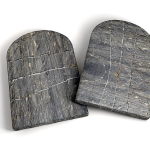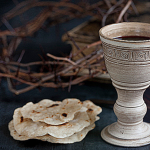Was Christ a Nazirite – a Nazorean?

The photograph shows an approximate appearance of the Nazirites, who were characterized by long hair. Let us face the theory put forward by some scholars that Christ was: a Nazorean, or a Nazirite, meaning that he took the Nazirite vows.
What does Nazorean mean?
This is the main verse cited for this theory:
“Then He went and settled in a town called Nazareth (Nazara – 3478) to fulfill what was spoken through the prophets, that He would be called a Nazarene (Nazoraios – 3480).”
This theory says that in the above verse it should be: „He shall be called a Nazorean”. Nazorean is associated with Nazirite and Nazirites. For this reason, Christ was supposed to have a Nazirite vow. Another argument that supporters of this theory present is the meaning of the word: Nazorean.
According to them, it means: „holy”, just like Nazirite, therefore where in the New Testament it speaks of the holiness of Christ, as for example in Luke 2:23 „He shall be called holy of the Lord”, it means: holy-Nazorean.
The equation that supporters of this teaching draw is as follows: Nazoreans = holy = Nazirites.
Who were the Nazirites?
A Nazirite/Nazarite was a person who had vowed, for a certain period or for his entire life, to fully devote himself to God.
YHWH set three main conditions for them. Every Nazirite had to fulfill them:
1 – First condition: The Nazirite could not consume alcohol, grape juice or grapes in any form:
„The Lord/YHWH instructed Moses, “Speak to the Israelites and tell them: When a man or woman makes a special vow, a Nazirite vow, (5139) to consecrate himself to YHWH, he is to abstain from wine and beer. He must not drink vinegar made from wine or from beer. He must not drink any grape juice or eat fresh grapes or raisins. He is not to eat anything produced by the grapevine (3196), from seeds to skin, during the period of his consecration.” – Numbers 6:1-4.
Word 5139 means, biblehub.com:
- • Nazarene, set apart.
• Nazir {naw-zeer’}; from Nazar, as a prince, a Nazarite; figuratively: an unpruned vine (like an unpruned Nazarite).
• Nazarene (by false alliteration with Nazareth), separate, an untrimmed vine.
Strong’s Paper Dictionary:
• someone consecrated or dedicated, a Nazarite,
• unpruned (vine).
2 – Second condition: prohibition of cutting hair:
„You must not cut his hair throughout the time of his vow of consecration. He may be holy until the time is completed during which he consecrates himself to YHWH; he is to let the hair of his head grow long.” – Numbers 6:5.
3 – Third condition: prohibition of approaching corpses:
„He must not go near a dead body during the time he consecrates himself to YHWH. He is not to defile himself for his father or mother, or his brother or sister, when they die, while the mark of consecration to YHWH is on his head.” – Numbers 6:6-7.
Was Christ a Nazirite?
Let us now check whether Christ was a Nazirite during His time on earth:
1. He did not drink/eat anything from grapes,
2. He had long hair,
3. He did not approach dead people.
1 – Did Christ not drink/eat anything from grapes?
„Then He took a cup, and after giving thanks, He gave it to them and said, “Drink from it, all of you. For this is My Blood of the Covenant, which is poured out for many for the forgiveness of sins. But I tell you, I will not drink from this fruit of the vine (288) from now on until that day when I drink it new with you in My Father’s Kingdom.” – Matthew 26:27-29
From this, we can draw the following conclusion: at the Last Supper with the apostles, Christ drank wine from the fruit of the vine.
2 – Did Christ have long hair?
„Does not even nature itself teach you that if a man has long hair (2863) it is a disgrace (819) to him, but that if a woman has long hair (2863), it is her glory? For her hair is given to her as a covering.” – 1 Corinthians 11:14-15.
Conclusion: If Christ had long hair, would the apostle Paul have used such words as saying that long hair for a man is a disgrace?
3 – Did Christ avoid contact with the dead?
„Remove the stone,” Yeshu said. Martha, the dead man’s sister, told Him, “Lord, there is already a stench because he has been dead four days.” Yeshu said to her, “Didn’t I tell you that if you believed you would see the Glory of God?” So they removed the stone. Then Yeshu raised His eyes and said, “Father, I thank You that You heard Me.” – John 11:39-41.
Let’s see a second example:
„Just as He neared the gate of the town, a dead man was being carried out. He was his mother’s only son, and she was a widow. A large crowd from the city was also with her. When the Lord saw her, He had compassion on her and said, “Don’t weep.” Then He came up and touched the open coffin, and the pallbearers stopped. And He said, “Young man, I tell you, get up!” The dead man sat up and began to speak, and Yeshu gave him to his mother.” – Luke 7:12-15.
Conclusion: Christ did not avoid contact with the dead. The Lord Yeshu entered the tomb and raised Lazarus from the dead. In the second example, Christ touched the bier on which the dead man lay. Did Christ „stain” his consecration?
From the above examples, it follows that Christ drank wine from the fruit of the vine, did not have long hair, and was around the dead. In a situation where Christ had taken Nazirite vows, or was a Nazirite, or as this theory says: a Nazarene, He would have „stained” His consecration:
„If someone suddenly dies near him, defiling his consecrated head, he must shave his head on the day of his purification; he is to shave it on the seventh day. On the eighth day he is to bring two turtledoves or two young pigeons to the priest at the entrance to the Tent of Meeting. The priest is to offer one as a sin offering and the other as a burnt offering to make atonement on behalf of the Nazirite, since he incurred guilt because of the corpse. On that day he is to consecrate his head again. He is to rededicate his time of consecration to YHWH and to bring a year-old male lamb as a guilt offering. But do not count the initial period of consecration (5145) because it became defiled (2930).” – Numbers 6:9-12.
Is it possible for Christ to stain, defile His holiness, His dedication?
NO – NEVER.
Since Lord Yeshu drank wine, did not have long hair and spent time with the dead, it means that He was not a Nazirite.
Let us also note the fact that Nazirites sacrificed themselves for YHWH. One of the Gods belonging to YHWH was the Son of God. He was created as the first spiritual Form. It was through Him that everything else was created. Therefore, it would be strange if He Himself made vows of sacrifice to Himself.
„The priest is to present them as a presentation offering before YHWH. It is a holy portion for the priest, in addition to the breast of the presentation offering and the thigh of the contribution. After that, the Nazirite may drink wine. “These are the instructions about the Nazirite who vows his offering to YHWH for his consecration, in addition to whatever else he can afford; he must fulfill whatever vow he makes in keeping with the instructions for his consecration.” – Numbers 6:20-21.
Author: Robert Brzoza
Translator: Hubert Brzoza

































































